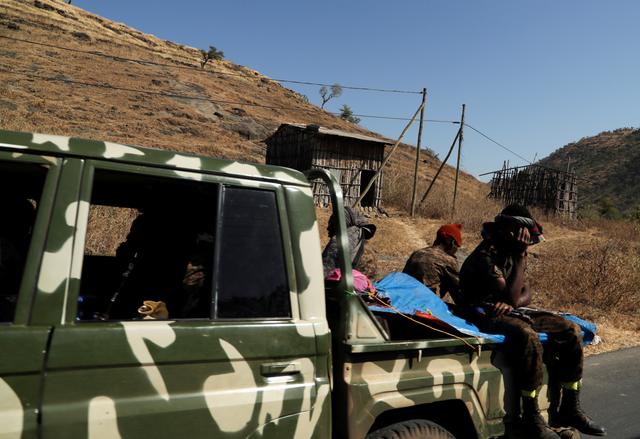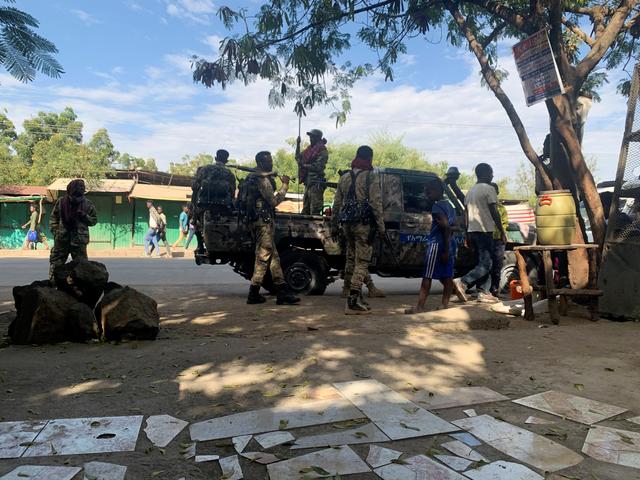Source: Reuters

FILE PHOTO: Members of the Ethiopian National Defense Force (ENDF) ride on their pickup truck as they head to mission in Sanja, Amhara region, near a border with Tigray, Ethiopia November 9, 2020. REUTERS/TIKSA NEGERI/FILE PHOTO

FILE PHOTO: Members of the Ethiopian National Defense Force (ENDF) prepare to head to mission in Sanja, Amhara region, near a border with Tigray, Ethiopia November 9, 2020. REUTERS/TIKSA NEGERI/FILE PHOTO
(Reuters) - Rebellious soldiers used government tanks to attack their former comrades in a military base in the first chaotic days of Ethiopia’s month-long war in the region of Tigray, according to two soldiers caught in what they described as a 10-day siege.
Forces still loyal to Tigray’s former ruling party, the Tigray People’s Liberation Front (TPLF), surrounded the Sero base near the northern border with Eritrea on Nov. 4, according to the two men. Within days, food and water were running low, forcing those inside to ration supplies, they said.
They said the siege reached a climax on day 10 when TPLF reinforcements arrived with tanks, anti-aircraft guns and mortars to try to seize the base. They described a six-hour barrage in which some soldiers tried to escape from the back of the compound but were captured.
“Even after we surrendered, they stabbed one of our members for no reason,” one of the soldiers, Takele Ambaye, said. He said he saw the bodies of 15 comrades, some with slash wounds, others who had been shot.
The description provided to Reuters by Takele and Molla Kassa, another soldier, supports government accounts of how the conflict started. It is also consistent with details given by a senior military officer at a news conference broadcast by state TV on Nov. 10.
However, the TPLF denies starting the conflict.
“We didn’t initiate any attack,” the group’s leader, Debretsion Gebremichael, told Reuters in a text message last month, although he said some soldiers “joined us by rejecting [the] federal treatment to Tigray.”
Reuters has been unable to reach TPLF officials for further comment.
Reuters also could not independently verify the two soldiers’ accounts as communications to that part of Tigray are down, and the government restricts access to the region. Government and military officials did not respond to requests for comment.
The government says its forces are now back in control of major cities and towns, and a new transitional administration is working to restore order in Tigray.
But the experiences recounted by Molla and Takele help explain why bitter divisions remain.
“The cruelest thing is I stayed there (in Tigray) for 21 years. I stayed there longer than with my own mother who raised me,” said Molla. “What kind of animals are they?”
Reuters spoke to Molla and Takele by phone this month, before an army spokesman announced a ban on soldiers speaking to the media. The men said that after their surrender, the TPLF held them captive in several locations before they were released with around 200 other soldiers from Sero, eventually reaching the town of Sekota in the neighbouring Amhara region.
Government officials have told Reuters that the TPLF trucked thousands of captive soldiers to the border with Amhara and released them. The officials have not specified whether soldiers from Sero were among them. Other soldiers were freed by federal forces as they advanced on the regional capital Mekelle, the government has said.
CONFLICT BEGINS
The government says fighters loyal to the TPLF attacked federal military bases at multiple locations in Tigray early on Nov. 4 after jamming communications. It says TPLF fighters took control of the headquarters of the military’s Northern Command in Mekelle and raided federal armories.
A United Nations security report dated Nov. 6, seen by Reuters, said Tigrayan forces had seized heavy weapons from several depots.
The fighters included members of the national defense force, who killed fellow soldiers in their beds and seized their weapons, Redwan Hussein, spokesman for the government’s emergency task force on Tigray, told Reuters previously.
At the Nov. 10 news conference, Lt. Gen. Bacha Debele said radio communications were cut at military bases across Tigray at 10:00 p.m. on Nov. 3. The next day, he said, a group of senior officers was kidnapped from a regular dinner with Tigrayan officials, while in other places, soldiers were surrounded.
“Many died on both sides,” he said, without providing evidence. “They buried their militia while they stripped our soldiers’ bodies of their uniforms and left them under the scorching sun…the dead were left to be devoured by vultures.”
BITTER DIVISIONS
Molla and Takele said shots were fired at the Sero base, where 250-300 government troops were stationed, at around 5 a.m. on the morning of Nov. 4. Initially, the attackers retreated when government soldiers returned fire, they said.
They said they asked local residents who was behind the attack and were told by a TPLF official that army commanders had agreed to surrender their arms to the TPLF and that soldiers inside the base should comply.
“We said we never received such commands from above and told them that we were not going to give up the arms. The arms belong to the nation,” Molla said.
In the ensuing siege, as TPLF forces surrounded the base, those inside rationed food to one meal of flour at midday to preserve supplies, but after eight days, the base ran out of food, they said.
“They ate us like a cat eats its child after giving birth,” Molla said.
The two soldiers said the betrayal by former comrades had cemented their desire to avenge their comrades and capture the fugitive TPLF leadership.
“We couldn’t even bury our friends and brothers. They stopped us from burying them,” Takele said. “I want to join my friends and fight.”
(Reporting by Addis Ababa newsroom; Editing by Alexandra Zavis and Nick Tattersall)Our standards: The Thomson Reuters Trust Principles.
So now Martin p came to know the truth why the Gov’ order ounter measure to restore law and order in the region. Sir we all equally citizens who have concer to civilian Tigaiyan. We also have sesies concern to ENDF norther command mebers who were assiadnated by criminal TPLF leaders and fellow commanders. You better understand the reality belind the curtine before you blindly support TPLF juntas.
“ The western media is doing little to no investigative reporting. It does not even try to give a complete picture of the conflict. It has not looked carefully at the role that the TPLF has played in the Ethiopian problem.”
https://www.ethiopoint.com/the-western-media-and-ethiopia/
The Reuter’s article above, although somewhat accurate, doesn’t go far enough in doing the hard work to find out what really happened on the night of November 3rd, 2020. Even though both Sekoture Getachew (a month ago) and Getachew Reda (in his December 4, 2020 BBC Focus on Africa) admitted that TPLF attacked the Northern Command, it still states “ However, the TPLF denies starting the conflict.”
Anyways, if one simply looks at the facts i.e. carrying out elections even though the House of Federation postponed the elections (it’s only the HoF that has the mandate to interpret the constitution and the National Elections Board that can constitutionally implement elections), then claiming in October that they no longer recognize the Federal government as a legal entity, recalling all their members from the HoPR and HoF to Tigray, claiming that they would go to war if the federal budget subsidies would no longer be disbursed, denying the movement of 3 Northern Command divisions from leaving the region in October to form the new North West Command, not allowing the new Northern Command general to take up his post after the previous one fell “mysteriously ill” etc. (without even mentioning the numerous reckless moves they made all throughout Ethiopia over the course of two years) TPLF has been a destabilizing force in Ethiopia itching for a conflict with the federal government. On November 3rd, 2020, high off of their arrogance, they made one of the biggest military miscalculations in modern history. Books will be written about the so called “generation that shook mountains” and how due to their fatal calculations, they no longer will be a political force in Ethiopia.
In the meantime, Western journalists and people like you need to do a much better job than what it is you think you’re doing now.